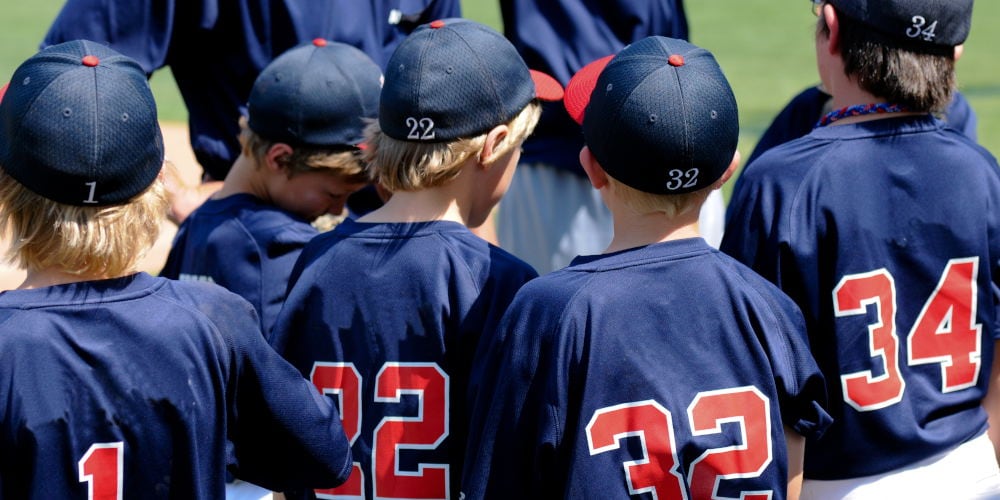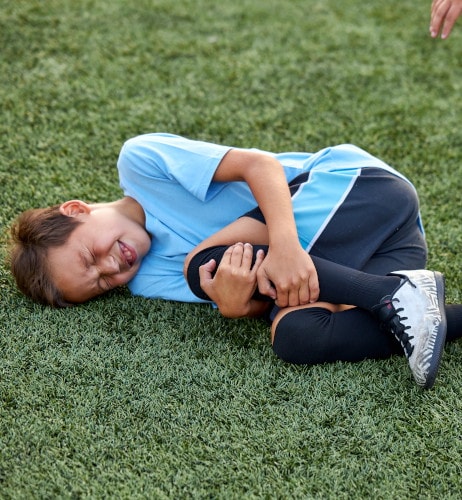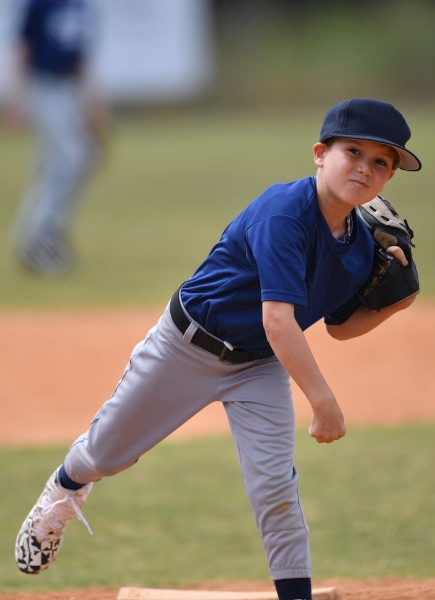What causes heel pain in children and adolescents?
Young athletes (8-14 years old) are at an increased risk for heel pain. However, less active adolescents may also experience this problem if they wear shoes that don’t support their feet.
Those at high risk of heel pain include children and adolescents who:
- Frequently run and jump, especially on hard surfaces.
- Participate in high-impact sports, such as gymnastics, volleyball, and basketball.
- Participate in baseball, especially pitching.
- Overtrain in a particular sport.
- Have flat feet.
- Are overweight.
- Wear shoes with limited padding and support — like cleats.
Heel and foot problems can develop gradually over time and are usually the result of overuse. Many children and adolescents are involved in competitive sports with rigorous training schedules that involve extended sports seasons. Overuse injuries are common but usually resolve with rest and conservative measures.

Youth baseball and heel pain
Playing baseball increases the likelihood of a child having heel pain because of the required motion necessary for certain positions. The most common position associated with heel pain is pitching.
During a pitching motion, there is increased pressure on both heels — from the shift in pressure on the heel as weight is transferred to pressure on the heel accepting the weight. This causes frequent inflammation of both heels. This also adds to problems in the heel during growth spurts.
What is Sever’s disease (calcaneal apophysitis)?
Sever’s disease is the most common cause of heel pain in children going through growth spurts, especially those who play sports or engage in physical activity regularly. This overuse injury is caused by repetitive stress on the growth plate in the back of the heel bone (calcaneus).
Growth plates are soft areas of cartilage where bone growth occurs. The calcaneal apophysis is where the Achilles tendon attaches to the heel bone.
Because bones often grow faster than muscle, the Achilles tendon can become tight at certain points in the child’s physical development. During a growth spurt, the Achilles tendon pulls on the back of the heel, which becomes inflamed and painful.
The most common symptom of Sever’s disease is pain or tenderness in the back of one or both heels, but foot pain can also extend to the sides and bottom of the heel.
Other symptoms may include:
- heel pain with limping
- walking on the toes
- swelling and redness around the heel
- foot discomfort or stiffness after sleeping
The symptoms of Sever’s disease are similar to those of plantar fasciitis or shin splints, but the conditions aren’t related.

Treatment for Sever’s disease
Your podiatrist (foot doctor) will gather information regarding your growing child’s activities and related symptoms. They will then examine the child’s foot at different points to see where it’s tender and painful. Diagnosis may include an X-ray to rule out a stress fracture or other problems.
Treatment options and medical advice for Sever’s disease may include:
- Avoiding activities that cause pain.
- Immobilization.
- Walking and non-weight-bearing exercises (like swimming).
- Ice or a cold pack on the heel every 1–2 hours, for 15 minutes at a time.
- Over-the-counter anti-inflammatory medication like ibuprofen (Advil) or acetaminophen (Tylenol).
- Using gel heel cups, heel lifts, and orthotics (shoe inserts) to decrease heel stress.
- Wearing shoes that are open in the back, so the heel is not irritated.
- Using an elastic wrap or compression stocking to help with pain and swelling.
- Physical therapy or a home exercise program to help with stretching and strengthening.
- Wearing a walking boot that limits the movement of the ankle/heel.
For severe cases — or if symptoms don’t go away after a few weeks of treatment — a short-leg cast may be put on for about a week.
Treatment is important and ignoring symptoms can lead to more severe injury and chronic pain.
What are the other causes of heel pain in children?
Achilles tendonitis
Achilles tendonitis is inflammation of the Achilles tendon that causes irritation and swelling. The Achilles tendon is a band of tough tissue on the back of the foot that connects the heel bone to the calf muscles.
Achilles tendonitis causes pain just above the heel and in the lower leg, especially after physical activities such as running. The pain gets worse when exercising and better with rest.

Other symptoms of Achilles tendonitis may include:
- Stiffness and soreness in the heel, especially in the morning.
- Swelling or hard knots in the Achilles tendon.
- A creaking or crackling sound when moving the ankle or pressing on the Achilles tendon.
- Weakness in the affected leg.
- Pain when pointing the foot.
- Pain with pressure from shoes.
While Achilles tendonitis is usually an overuse injury, it can also be caused by poor-fitting shoes, a sudden increase in physical activity, or not stretching before and after exercise.
Achilles tendonitis can affect children and adolescents who play sports that put a strain on the heel, such as running, jumping, tennis, basketball, figure skating, skiing, and many other sports.
To diagnose Achilles tendonitis, your podiatrist will perform a physical examination of the area, probing for tenderness and pain.
Achilles tendonitis treatment
Treatment for Achilles tendonitis starts with taking a break from the activity that led to the injury. It’s usually OK to do non-weight-bearing exercises such as swimming, biking, and yoga. Custom inserts (orthotics) may also be provided to better support the foot and prevent further tendon strain. If someone with Achilles tendonitis does not rest, the tendon can become more damaged.
Your health care provider also may recommend:
- Stretching multiple times a day.
- Using an ice pack or athletic tape to decrease swelling.
- Keeping the foot elevated will help with swelling.
- Over-the-counter anti-inflammatory medication for pain management.
- Physical therapy to rebuild tendon strength.
Plantar fasciitis
Plantar fasciitis is an overuse injury that involves irritation of the plantar fascia — the thick band of connective tissue that runs along the arch from the heel to the front of the foot.
It can occur in people of all ages, including children. Symptoms include:
- Pain in the bottom of the foot close to the heel.
- Difficulty walking.
- Tenderness or tightness along the arch of the foot.
It’s usually worse in the morning and gets better throughout the day; symptoms usually start mild and get worse over time.
Treatment includes rest, ice, compression, massage, and elevation. When symptoms appear, children should avoid doing activities like running or jumping and refrain from long walks and extended periods of standing.
Over-the-counter anti-inflammatory medication can help reduce pain. Rolling a tennis ball along the arch of the foot can help massage the area and increase circulation, leading to faster healing.
Sometimes, special orthotic shoes are recommended to prevent re-occurrence. Figure-eight taping of the foot may also help by providing extra support.
Should children play sports with heel pain?
Playing sports and participating in other physical activities can have many positive benefits, but injuries can occur. Playing through the pain isn’t the best solution when it comes to heel injuries.
After a proper evaluation from a podiatrist, heel pain can be easily treated at home. As children grow and continue to be physically active, they may encounter various pains and strains. As a parent, it’s best to encourage healing, rest, and recovery.
At University Foot & Ankle Institute, we recommend active, growing children protect their heels in the short term and see their foot and ankle specialist for a complete evaluation if the discomfort persists.
Why choose University Foot and Ankle Institute for your foot and ankle care?
Whether you need to find proper footwear, treat an injury, or get advice on proper foot care, we’re here to help. Our podiatrists offer the most advanced podiatry care and the highest success rates in the nation. We are nationally recognized foot and ankle specialists and leaders in researching, diagnosing, and treating all foot and ankle conditions and common injuries.
For a consultation please call (877) 736-6001 or make an appointment online now.
Our podiatrists take patients’ safety seriously. Our podiatry facility’s Covid-19 patient safety procedures exceed all the CDC’s coronavirus pandemic recommendations. Masks are always required in our institutes.
University Foot and Ankle Institute is conveniently located throughout Southern California and the Los Angeles area. Our foot doctors are available at locations in or near Santa Monica, Beverly Hills, West Los Angeles, Manhattan Beach, Northridge, Westlake Village, Granada Hills, Valencia, and Santa Barbara.
- Revolutionizing Extremity Imaging: UFAI’s Open MRI for the Foot and Ankle - October 21, 2023
- Youth Sports and Heel Pain: Should Kids Play with Pain? - April 4, 2023
- All About Foot Arch Pain and Foot Arch Cramps - March 15, 2021